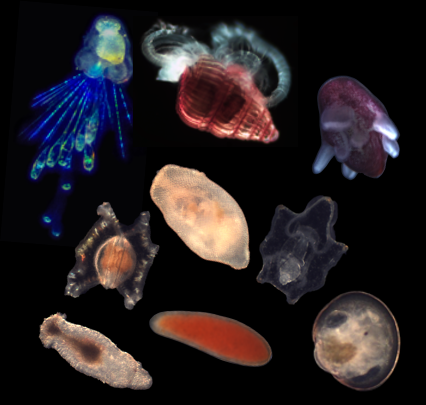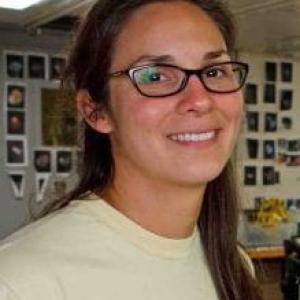Deep Seafloor Life in the Water Column
Archived video of this presentation.
Visually striking animal communities cluster around deep-sea cold seeps and hydrothermal vents. These animals don’t spend all of their lives on the seafloor, though. Instead, they spend a portion of their lives as tiny larvae making their living in the overlying water column. Dispersal of these larvae among vent and seep sites is critical for population maintenance, colonization of new sites, and recolonization of disturbed sites. Thus, reliable predictions of larval dispersal patterns are central to guiding conservation efforts and understanding large-scale biogeographic ranges of these species. Bio-physical models of larval dispersal require data on biological parameters such as spawning times and locations, larval duration, vertical distribution in the water column, and swimming behavior. Nevertheless, fully understanding these parameters is difficult even in shallow-water animals. Whether larvae of deep-sea animals make long vertical migrations to the sea surface and or remain near their seafloor homes will have profound effects on their dispersal, population connectivity, and biogeography, yet the extent and timing of their vertical movements remain unknown for all deep-sea larvae. This seminar will explore what we know about the movements and migrations of deep-sea, cold-seep and hydrothermal-vent larvae and describe how we are using modern technologies to collect data on larval biology and behaviors in order to produce the first deep-sea larval dispersal models that are informed by real biological data.
~ ~~ ~ ~ ~ ~ ~ ~ ~
Western Washington University Assistant Professor of Biology Shawn Arellano, three WWU graduate students, and two undergraduate interns will be on a research cruise on the R/V Thomas G. Thompson, above, this summer in support of Arellano's research into how the larvae of certain bottom-dwelling organisms that live along rents in the crust called seeps make their way via currents from the Atlantic Ocean into the Gulf of Mexico and vice-versa. The team members for the "SALT: Seep Animal Larval Transport" research group, which includes faculty and students from four institutions (below) are currently quarantining at Woods Hole on Cape Cod as they prepare to leave port and begin their cruise; follow their work on the SALT blog at https://wp.wwu.edu/arellanolab/category/salt/.
You can see the location of the R/V Thompson in real time here.


About the Speaker

Shawn Arellano is a marine ecologist, broadly interested in the ecology of marine invertebrates and focused on the ecology of early life-history stages. Her research primarily focuses on the behavioral and developmental mechanisms that affect larval dispersal and successful recruitment of invertebrates, including reproduction, larval swimming behavior, larval development and physiology, invertebrate and microbial interactions, settlement dynamics, and metamorphosis. Much of her work is focused on deep-sea ecology, especially within chemosynthesis-based ecosystems including cold seeps and hydrothermal vents. She has participated in 21 research cruises, worked with remotely operated vehicles and automated underwater vehicles, and conducted 24 manned submersible dives in four different subs including three dives in HOV Alvin—the deepest being more than a mile and half deep.
Dr. Arellano is strongly committed to undergraduate and graduate student mentoring and to increasing diversity in science. She has been involved with several activities and programs with that aim. She has mentored undergraduate researchers through the Shannon Point Marine Center’s Minorities in Marine Science Undergraduate Program and Research Experience for Undergraduate Programs. She developed and has run Western’s Marine Science Distinguished Scholars Program (MSSP) to provide marine science experience to incoming freshman and sophomores since 2012 and was involved with the development of Western’s new Marine and Coastal Science (MACS) undergraduate degree program. She is a faculty member in the Biology department with the MACS program.
Environmental Speaker Series
The Environmental Speaker Series is hosted by the College of the Environment at Western Washington University.
The Series is free and open to the public. Talks are held each Thursday at 4:30 pm in Academic Instructional Center West room 204 - AW-204. Talks will also be streamed via zoom. Register with the Alumni Association for the zoom link. Paid parking is available in lot C.
Learn more about the Environmental Speaker Series
Subscribe to the Email List